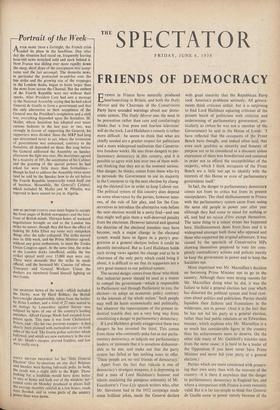—Portrait of the Week
AFTER MORE THAN a fortnight, the French crisis ceded its place in the headlines. Day after day the situation had raced on, frequently leaving hour-old news stretched cold and stark behind it. Now France was sliding ever more rapidly down the steep, short slope of the escarpment into accep- tance and the fait accompli. The domestic news, in particular the protracted to-and-fro over the bus strike and the growing size of the stoppages in the London docks, began to loom larger than the news from across the Channel. But the embers of the Fourth Republic were not without their sparks. After President Coty had sent a message to the National Assembly saying that he had asked General de Gaulle to form a government and that the only alternative to their acceptance of the General was the President's resignation and a civil war, everything depended upon the Socialists. M. Mollet, whose Socialism has adopted ever more curious fashions in the last year or two, was strongly in favour of supporting the General; his supporters were divided. Since the MRP had long ago determined never to act, where the formation of governments was concerned, contrary to the Socialists, all depended on them. But long before the General addressed the Assembly on Sunday afternoon the fight was over. His investiture agreed by a majority of 105, the acceptance of his Cabinet and the granting of the special powers he had asked for were little more than formalities— though he had to address the Assembly twice more (and be told by the Speaker how to do so) before the Fourth Republic temporarily voted itself out of business. Meanwhile, the General's Cabinet, which included M. Mollie and M. Pfiimlin, was reported to have caused no joy in Algeria.
* AND SO BRITISH EVENTS once more began To occupy the front pages of British newspapers and the fore- front of British minds. Thirteen hours of weekend negotiations brought an end to the London bus strike no nearer, though they did have the effect of making Sir John Elliot say some very outspoken things after the talks collapsed. The strike moved into its fifth week, and the Prime Minister agreed, without any great enthusiasm, to meet the Trades Union Congress again. At the same time, the strike at the London docks (unofficial, unlike the bus strike) spread until over 15,000 men were out. There were demands that the strike be made official, and the harassed, Mr. Cousins (of whose Transport and General Workers Union the dockers are members) found himself fighting on two fronts.
THE SPORTING NEWS of the week—which included the Derby, won by Hard Ridden; the British heavyweight championship, taken from the holder by Brian London; and a total of 27 runs scored in an innings by Lancashire against Surrey—was eclipsed by news of one of the country's leading outsiders. Alfred George Hinds had escaped from prison again. This time it was from Chelmsford Prison, and—like his two previous escapes—it had clearly been planned with meticulous care on both sides of the wall. The frantic police activities which followed, and which are now customary in the case of Mr. Hinds's escapes, proved fruitless, and few were really sorry.
*
WHILE BRITAIN PREPARED for her 'little General Election' (five by-elections on one day) Belgium and Sweden were having full-scale polls. In both,. the result was a slight shift to the Right. Those looking for a landslide would have done better to stay at home and look out of the window; for-'' rential rains on Monday produced in places half the average monthly rainfall in a few hours; roads were flooded, and in some parts of the country Power-lines were down.










































 Previous page
Previous page